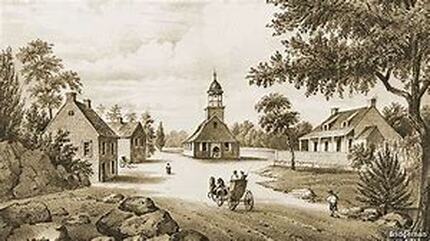
The timeless tradition of beautiful folk hymns is part of our American History. We owe a lot to our forebears for the gorgeous melodies and texts of "Come Thou Fount," "Be Thou My Vision," "Simple Gifts," "Saints Bound for Heaven," and the "Battle Hymn of the Republic," to name a few. These songs and hymns reach into our souls and provide voice to the yearnings and feelings of devotion that we long to express. Many of these tunes and texts were in effect written "by committee." In other words, the ideas have been sung and modified and developed over many years from many situations. Verses have been added and arrangements have been made that may or may not have modified the original melodies. The originals may never have been written down, so how would we know? What we have had handed down to us is the best of the collective memories. Each succeeding generation has had an arranger or two that puts his unique stamp on the piece and gives it new life.
Many of the tunes and texts that we so admire were actually written separately. Congregations in olden times generally only had the texts of the hymns printed for their use. Most congregations sang without accompaniment, in unison or made up their own harmony parts. The tunes were well-known and matched to whatever text suited them that day. Many texts were matched to several different tunes. The tunes even had their own titles, such as "Old Hundredth" that we know today as the tune to "Praise God From Whom All Blessings Flow." The song leader or clergyman would stand up and announce the page of text and state which tune it would be sung to. Some hymnbook collections today have a list of tunes and texts in the glossary that gives meters and suggestions for matching tunes and texts. Only in recent times have the hymn texts and tunes become so synonymous. Then again, there are also newer hymns that were written with composer and lyricist collaboration and would never be considered for alternate tunes. (But very likely could be!)
So with all of that said, I have no remorse in admitting that some of the texts and tune pairings we have in our hymnals do not seem to match very well. For example, one hymn text that I have always thought was such a happy, joyous message has been matched with a plodding, monotone hymn tune in our 1985 LDS Hymnal. "Come, All Ye Saints Who Dwell on Earth" is a Hymn Text that was written by William W. Phelps (1792-1872) and included in the first LDS Hymn book in 1835. It has been paired with a hymn tune by William B. Bradbury (1816-1868) called "Keokuk." Yes, the meters do match: 8686 868686, but that is about all that does.
Because I felt so sorry for W.W. Phelps' incredibly uplifting text about Enduring to the End and looking forward to Exaltation in the Celestial World due to the Atonement of Jesus Christ...well, I just needed to do something!
In keeping with tradition, I offer my own attempt at a Folk Hymn Tune, and introduce a new setting (a happy, upbeat setting!) for this text.
Enjoy!
 RSS Feed
RSS Feed